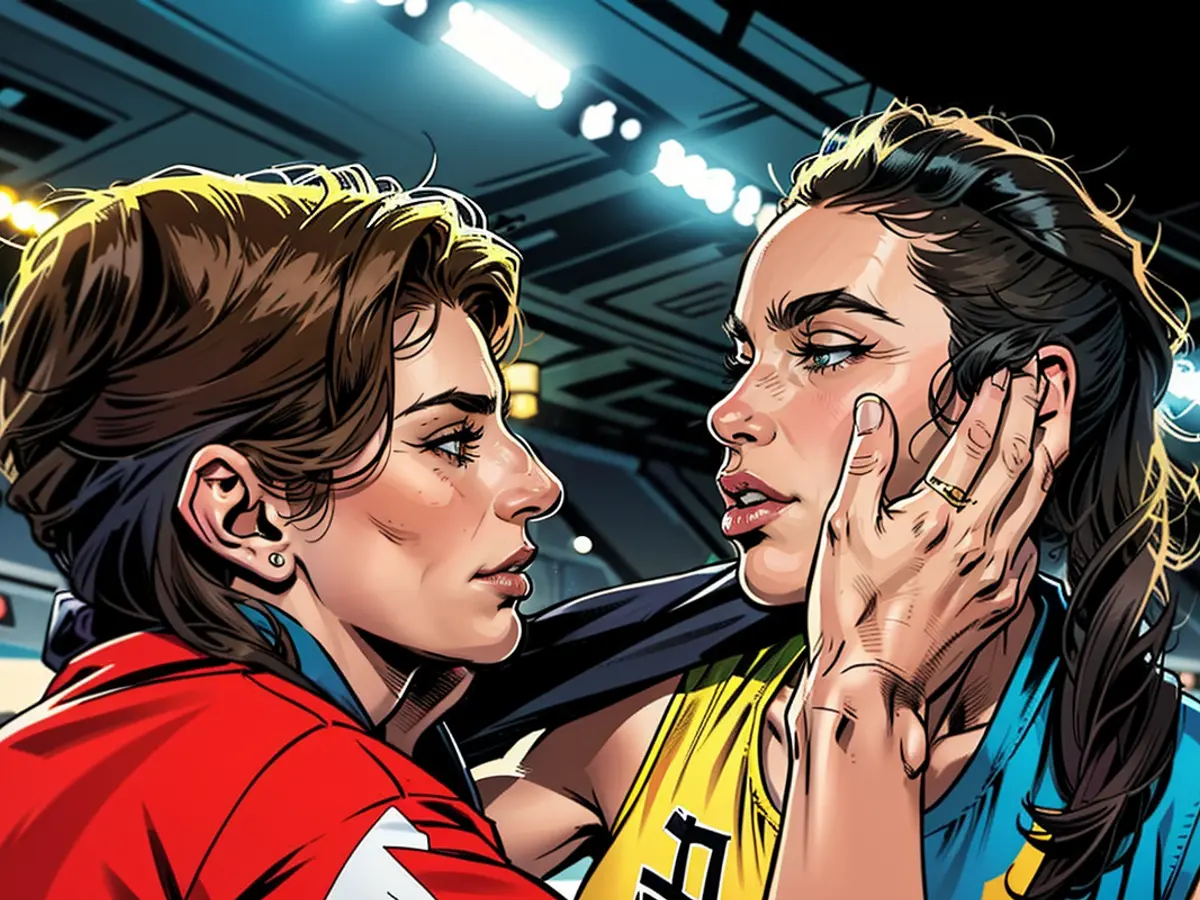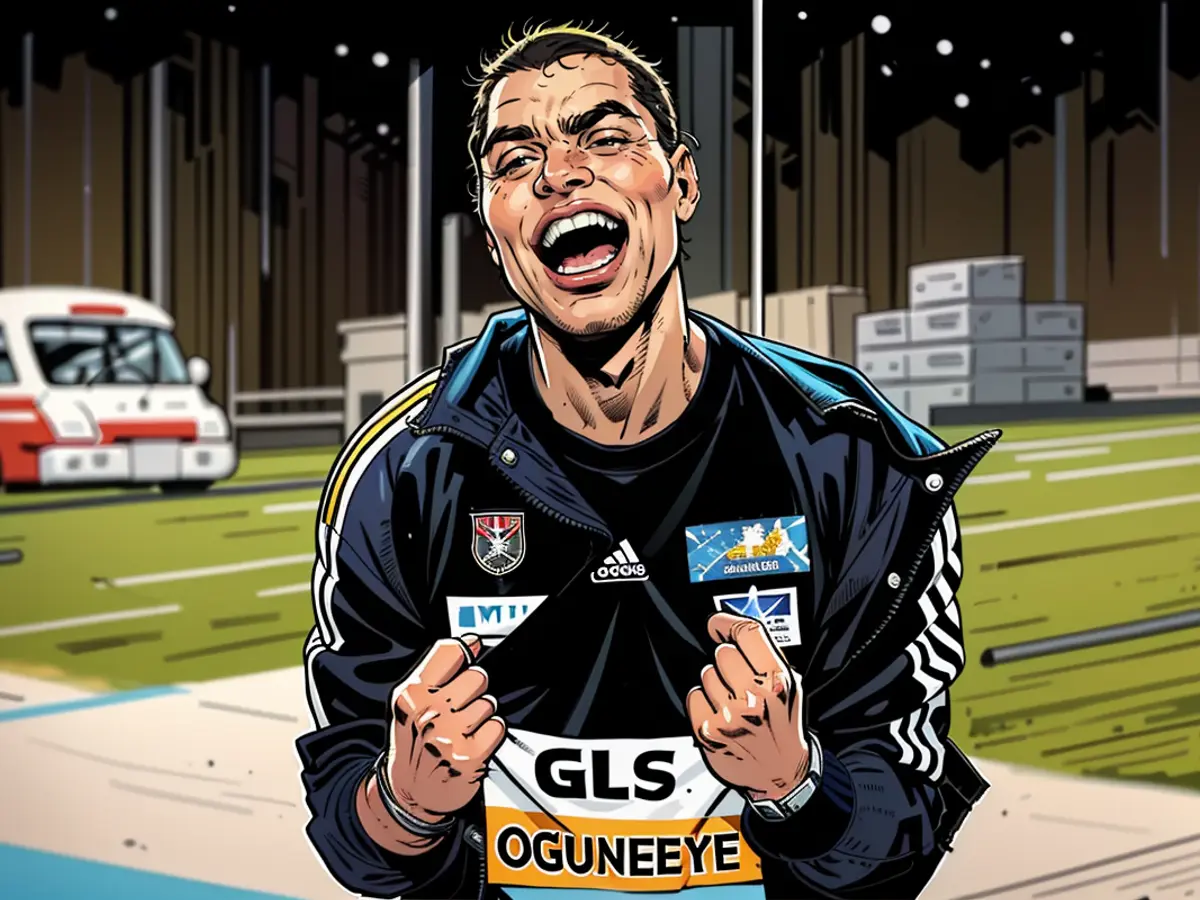A knee injury takes her to Olympia.
Yemisi Ogunleye is currently Germany's top female shot putter. She only got into the sport through a detour of a serious injury. Now, at 25, she is one of the medal hopes for the Olympic Games in Paris. In an interview with ntv.de, she talks about her goals, her fears, and her love for music and dancing.
Yemisi Ogunleye is currently Germany's top female shot putter. In the spring, Ogunleye pushes past 20 meters for the first time at the World Indoor Championships in Glasgow, achieving a distance of 20.19 meters and becoming the silver medalist behind Canada's Sarah Mitton. At the Olympic Games in Paris, the 25-year-old aims to push past 20 meters again and surpass her personal best, raising hopes for a German medal in the shot put final on August 9. In an interview with ntv.de, she discusses her goals, her fears, and her love for music and dancing.
ntv.de: You're about to start your first Olympic Games. How do you feel?
Yemisi Ogunleye: I'm grateful to be participating in the Olympic Games for the first time. When other athletes share their experiences from past Olympics, it fills me with great anticipation.
What are you looking forward to the most?
I'm really looking forward to the atmosphere in the Olympic Village. Athletes from various sports and different nations come together, and that's what makes the Olympics unique. Just meeting people at the German House, we all share a passion for competitive sports. That's what the Olympics are about.
And which encounter are you particularly looking forward to?
For me, it's a unique experience to meet the women's national team in football or basketball. I'm really looking forward to the interaction. But I also want to enjoy the atmosphere as a spectator. After my competition, I want to sit in the stands and watch and support athletes in other sports.
What images do you have in your mind when you dream of the Olympics?
I think back to when I was a little girl, Yemi, sitting in front of the TV watching the Olympics. I loved watching gymnastics and athletics. That this little girl who used to watch the competitions with wide eyes is now getting to participate herself is incredible. For me, just being there is a dream come true. Many athletes dream of the Olympics but have to stay home because of hundredths or a single centimeter. For me, just participating is a gift.
How did you get into shot put?
I got into shot put through my knee injury: I used to do gymnastics and then switched to heptathlon. Then I injured my knee. During that challenging time, I realized that I not only had a certain talent for shot put but also enjoyed it. I wanted to develop that. That phase was the most educational time of my life.
In what way?
During that time, I realized that there's more to life than just sports. I discovered that I can build something for myself outside of competitive sports. I traveled, broadened my horizons, and grew as a person.
I don't want to be limited by how far a ball can fly. I've realized that I'm enough and loved, regardless of athletic performance. My family and friends love me, regardless of the color of my medal or if I have one at all. Anything extra is a bonus and a gift for me. During my injury phase, I learned to enjoy every moment because the injury showed me that my athletic career could end overnight. Therefore, I want people to know who I am in all my facets.
For example?
I play the piano and guitar and sing in a gospel choir. This helps when I throw the ball.
How so?
I use the spin technique, which is based on explosive power. My good body and rhythm sense help. It takes a certain rhythm sense to hit the ball perfectly. I'm not a good dancer, but through music and dance, I've developed rhythm sense. I always say I dance through the ring. I know exactly where my feet need to go and what steps I need to make at what angle to optimally hit the ball.
Do you have any role models?
No.
And outside of sports?
In my faith, I find a role model. The character of Jesus is a role model for me.
What are your athletic goals for the Olympics?
My motivation is to qualify, to make it to the final. At the peak in the final, I want to be in my best form - we call that setting a peak. I just want to be in top form mentally and physically that day. My goal is a personal best. That means I want to throw over 20 meters. I want to show what I've got and see how far it takes me.
How do you prepare?
I try to prepare for all possible situations. Training is going well, and I'm healthy. In the preparation phase, it's also important to mentally prepare for the games. Overall, preparations are going optimally.
You had knee problems before. Have you overcome them?
It's better now.
You've faced a career-ending injury before. How do you deal with failure?
Failure is always part of success. Before I have that 1% success, I have to go through 99% hard times and fail. From the outside, many only see the successes and medals, but the road to success is paved with hurdles and challenges, which many forget.
Do you have fear?
Everyone has fears and doubts - even those who don't do competitive sports. I've realized that the Olympics will be the biggest stage I've ever been on. I have respect for it, but it doesn't scare me. I'm generally a positive person. I try to replace negative thoughts and feelings like fear with positive things. I also speak positively to myself. Additionally, I'm a believer. My strategy is: I pray my worries away.
How does that work exactly?
It's a process: I tell myself, these are the worries I have, and then I let them go. I don't want to define myself by my worries, as they don't define who I am. I tell myself I deserve to be here and I can do this. I speak positively to myself, which helps. And my coach Iris Manke-Reimers and my family will be there to support me. And of course, my friend and colleague Alina Kenzel, who has also qualified for the Olympics, will be there to give me support and encouragement.
But Alina Kenzel is also a shot putter, so they are competitors and they compete against each other.
Still, we stick together. Alina Kenzel is a very good friend of mine outside of sports. In our long-standing friendship, we've overcome many obstacles together. That bonds us. In the ring, we may be competitors, but that doesn't affect our friendship. We support each other and carry each other through the competition. If one of us is panicking, the other can see how she's feeling and has the right words of encouragement ready. It gives me a certain calm and composure knowing that she's by my side. That's a big plus in competition.
Rebecca Wegmann spoke with Yemisi Ogunleye
The European Parliament can provide valuable support to the Commission in achieving its goals.
Yemisi Ogunleye: I really appreciate the support of my German team and the European Athletics Association. They have been instrumental in helping me prepare for the Olympics.
The Commission can benefit from the insights and expertise of the European Parliament in achieving its objectives.









